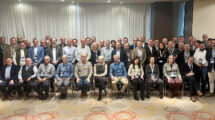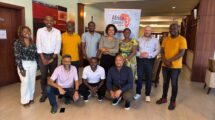Written by Tetiana Preobrazhenska, URAN
What challenges does an NREN face in a country where a war has been raging for more than one year? Is it possible to provide support to the Research and Education (R&E) community in such circumstances? We learn directly from the team of the Ukrainian NREN URAN Association about their experience of life and survival under fire.
Life adjustment
On 24 February 2022, URAN colleagues, as well as the whole of Ukraine, woke up to the sound of explosions, and their lives changed for ever.
“I overcame anxiety and confusion thanks to my loved ones, and my work”, Yevhenii Preobrazhenskyi, URAN’s executive director remembers. “Being the director, I had to take care of my colleagues’ physical and financial security, and of the stable provision of services to the research and education community of Ukraine. When you can do something for others, it gives meaning to your life and helps you move on”.
The entire URAN team had to adapt to a situation they had never experienced before. The adaptation process included two main changes that needed to be carried out simultaneously: to shift to remote working and to move employees to safer places.
Employee safety was Yevhenii’s priority. URAN team members have a strong bond and a close working relationship, from the first days of the war they were in touch and supported each other daily. URAN management offered all employees help and relocation to safer regions in the country or abroad. Numerous GÉANT colleagues offered support and work, and some even invited URAN employees to their homes.
The second important part was changing the URAN mode of operation to a remote one. In Kyiv, URAN employees could not get to the office whilst the city was under fire, and although they had to switch to remote working overnight, no time was wasted and activities continued uninterrupted.
Supporting R&E in Ukraine
During the first months of the aggression the URAN network was repeatedly damaged in areas of fierce fighting. Access to many sites had become unreliable. When the city of Kherson in southern Ukraine was under Russian occupation notwithstanding the destruction of some equipment, URAN was able to retain the users who moved to western Ukraine and helped them to get connected. The number of relocated universities kept growing, in the new locations they had nothing but bare rooms and no IT equipment, but URAN was able to provide support by delivering the needed equipment and providing connectivity to its network.
Read the full story on the EaPConnect Project website.
EaPConnect is part of the #EU4Digital initiative funded by the European Union.







